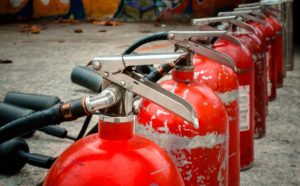
Does your fire extinguisher freeze?
Wintertime is here and there is no more important time to worry about fire safety than this season. In fact, house fires constantly occur during winter than other times of the year, owing to the heavy usage of heating equipment. By now, you should know that one of the most critical aspects of residential fire safety is having a fire extinguisher around your home. But will your fire extinguisher freeze? If yes, how do you prevent it?
Why Freezing Can Be Problematic
So, some fire extinguishers can freeze in ambient temperatures below 40 degrees Fahrenheit. As a result, your fire extinguisher will become permanently unusable. If you believe your pressurized water fire extinguisher has been exposed to temperatures below that threshold, it’s ideal to be cautious and purchase a new one. This is fine for many homeowners because most stay above that 40-degree mark during the freezing winter months. Here are a couple of scenarios where it may be a problem:
- The fire extinguisher is stored in a poorly insulated area, such as a shed or garage
- Your house lacks central heating
- You are a business owner who doesn’t heat the site at night
There are few things that could be more devastating during a fire than realizing your fire extinguisher will not work because it has frozen somewhere. Let’s explain how this can be prevented.
Two Prevention Methods
The most apparent solution to freezing fire extinguishers is to place them somewhere freezing, which won’t be an issue. Even something simple, such as moving the device away from a poorly insulated window, can be an excellent way to do this. If you keep one in your garage, consider putting it on the other side of the door leading into your home because this would enjoy the benefit of more insulation.
If removing the threat of cold isn’t optional, remember that not all fire extinguishers freeze. Instead, seek extinguishers that utilize dry chemicals instead of mist or pressurized water. There is a good chance you already have one because dry chemical extinguishers are recommended for most fires. In addition, pressurized water should be used on Class A fires.
Moreover, dry chemical fire extinguishers can handle freezing temperatures with no problem whatsoever. If you have verified that your fire extinguisher is not pressurized mist or water, then you can put the threat of freezing out of mind.
Commercial and Residential Fire Prevention from Judd Fire Protection
If you want to ensure your home and business are safe throughout the year, trust Judd Fire Protection, LLC. We have over two decades of experience designing, installing, inspecting, and repairing residential and commercial fire protection systems. We serve clients throughout Maryland, Pennsylvania, Washington, D.C., Virginia, and West Virginia. If you are interested in finding out more about our services and protecting your home and business, give us a call at 410-871-3480.
